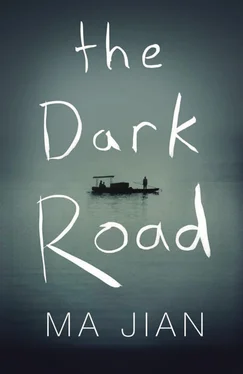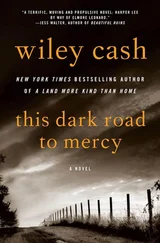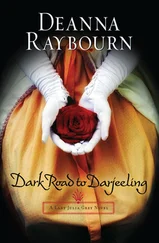When he finally reaches the shore, he stares out at the lake’s maroon surface and says, Nannan, your daddy loves you. If you come back, I promise I’ll never get angry with you again or make you recite Tang poems or the Analects . Then glancing down he sees, to his amazement, Nannan’s plastic doll, its blue eyes staring up at him through the murky water, its flesh-coloured limbs only faintly visible beneath.
Don’t pick it up, he hears Meili say to him. It’s not Nannan’s doll. Her one had a red dress.
The chemicals in the water would have dissolved the dress long ago.
But, don’t you remember — she lost the doll when we moved into the shack, not out here by the lake.
It could have fallen into a channel and been swept down by the current. The rivers flowing out of the lake are choked with refuse, so it’s not surprising that it should end up floating by the shore.
You sound like a professional corpse fisher! Listen, Kongzi. That doll is called a Barbie Doll. My shop sells hundreds of them. There are probably more Barbie Dolls in this world than there are real people. You can find them scattered over every rubbish dump in this town. It’s filthy. Just leave it where it is.
Kongzi reaches into the water and fishes out the doll by its leg. When he sees that the red paint on its mouth is unchipped, he flings the doll onto the mound behind.
After he returns to the path, a girl who looks about three years older than Nannan calls out, ‘Would you like to buy a CD drive? We’ve got Sony and Samsung.’ She’s standing at the end of a road that leads to the market. Kongzi knows that round the corner is a shop that sells sugar cane, dried tangerine peel and ground ginger.
He walks up to her, takes the leaflet she offers him, then passes her the photograph of Nannan and says, ‘Have you seen this girl? She has a large burn scar on her left foot.’
‘No, I haven’t seen her, but I have a dress like that.’ The last light of the sun is reflected in her dark eyes. The small shed behind her is surrounded by stacks of computer drives.
‘Have you worn it recently?’ asks Kongzi, remembering someone telling him he’d seen Nannan near the lake a couple of days ago. He catches a chemical smell as sweet as osmanthus drifting from the trees or from the crushed components on the ground. His mind turns to Meili, who for the first four days after Nannan’s disappearance wandered through Foshan holding a missing-person placard. When she returned to the shack in the evening, she’d slump onto the bed and chant: ‘She has two rotten molars and a burn scar on her left foot… She likes milk and sweets… When I took her to the baby clinic for her first jabs, she soiled her trousers and I had to wash her in the fountain outside… When she was learning to walk, she’d struggle up onto her feet hugging her big toy rabbit, take three steps, then topple to the ground, still holding her toy tightly in her arms…’ But last night, Meili didn’t return home.
He wonders what he will do after he phones his parents again tomorrow and is told once more that Nannan hasn’t turned up. A shiver runs down his spine. She hasn’t gone back to Kong Village, she hasn’t drowned herself in the lake, so she must have been kidnapped and sold to a peasant in the mountains. He often reads about the police rescuing abducted women who’ve been sold to men in the remote countryside. But Nannan is only eleven — too young to be anyone’s wife. She must have been sold into the sex trade, then. The papers often report on police efforts to crack prostitution rings. Yesterday he read about three teachers who pimped their pupils to corrupt officials, personally escorting the teenage girls to the officials’ private homes.
As always after the sun sinks out of view, the sky becomes bathed in reflected light, the lake turns gold and the town shimmers like burnished glass. When they lived in the metal hut on stilts, Nannan would come to this part of the lake, wade in up to her knees and fling things in the water. She flung Kongzi’s straw hat in here, a thermos mug she’d burnt her lips on, a satchel with a broken strap, a pair of shoes that pinched her toes and a battery-operated car that wouldn’t stop beeping. She threw almost everything she disliked into the water, as she felt the water was connected to her unhappy past.
Kongzi turns back and heads for their shack on the outskirts, which since Nannan’s disappearance feels to him more like a coffin than a home. He feels that he has nothing left now but the wounds on his body. He wishes he could dig a knife into his hand, so that for a moment he could forget his torment. As he walks along, he can remember carrying Nannan to her cot when she was a baby, the sound of her breathing contentedly into his neck, the feeling of her saliva dampening the collar of his shirt. He’d hold her close to his chest, patting her softly on the back until he was certain she was asleep, but as soon as he leaned over the cot to put her down, she’d pat his back with her little hand to let him know she was still awake. He remembers how, when they were living on the boat, Nannan would often shake him awake in the middle of the night and shout, ‘Stop making that horrible noise!’ and he’d quickly roll onto his side because Meili had told him he snores like a pig when he’s on his back. What haunts Kongzi most of all is Nannan’s unfulfilled yearning for Kong Village. He’d presumed that since she was only two when they left, she’d soon forget it. But nine years later, she still had vivid memories not only of his mother, but of the date tree in the yard and the snow that fell in winter. She said the snowflakes were black when they fell from the sky but turned white when they settled on the ground. He’d given her his word that they’d return to the village as soon as Heaven was born. Some memories can’t be blown away: they force their way back, flying against the wind, and hover stubbornly around the mind. But all his memories feel empty now. If Nannan doesn’t return, not even little Heaven will be able to fill the void she’s left. He feels guilty about selling Waterborn, and the pain it caused the family. Meili was so distraught, she ran away from home, and Nannan cried for weeks afterwards, begging him to bring Waterborn back. This is his punishment. For giving away a child he didn’t want, he has lost the child he loves. Why do people who leave their native soil always suffer a miserable fate?
Kongzi’s phone rings.
‘I’ve found Meili,’ Tang tells him. For the last five days, Tang has searched every Custody and Repatriation Centre in the province, and has posted missing-person notices on hundreds of websites. When Meili didn’t come home last night, Kongzi asked Tang to look for her as well.
‘Take her back to our shack,’ Kongzi replies. ‘I’m on my way there myself. It’s too dark to see anything now…’
The news wakens Kongzi from his daze. At least Meili has been found. Yesterday, she said she couldn’t bear to stay inside their shack another second because she could feel Nannan’s breath flowing from every object in the room. On the phone just now, Tang said he was going to take Meili to hospital as she seemed disturbed and confused. He’d found her sitting on a pavement, smashing a rock against the locked entrance of a sauna house. He said she was in such a bad way that if she passed Nannan in the street now, she probably wouldn’t recognise her.
As he proceeds through the dark, Kongzi flares his nostrils like a dog, trying desperately to sniff out the scent of his daughter from the confusion of toxic vapours. The smell he remembers most vividly is the musky scent of Nannan’s neck. Unlike the acrid chemical stench of Heaven’s air, this scent was earthy and natural and made him think of the soil, the seeds and the water that lie beneath the thick layers of electronic waste.
Читать дальше












